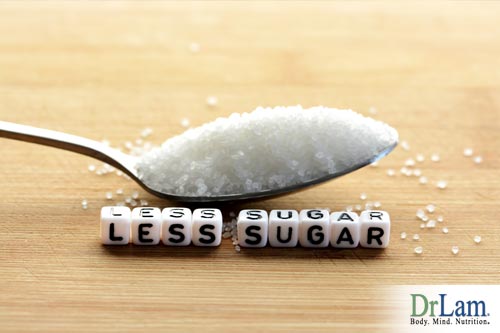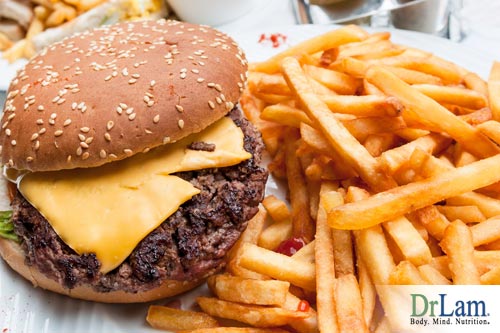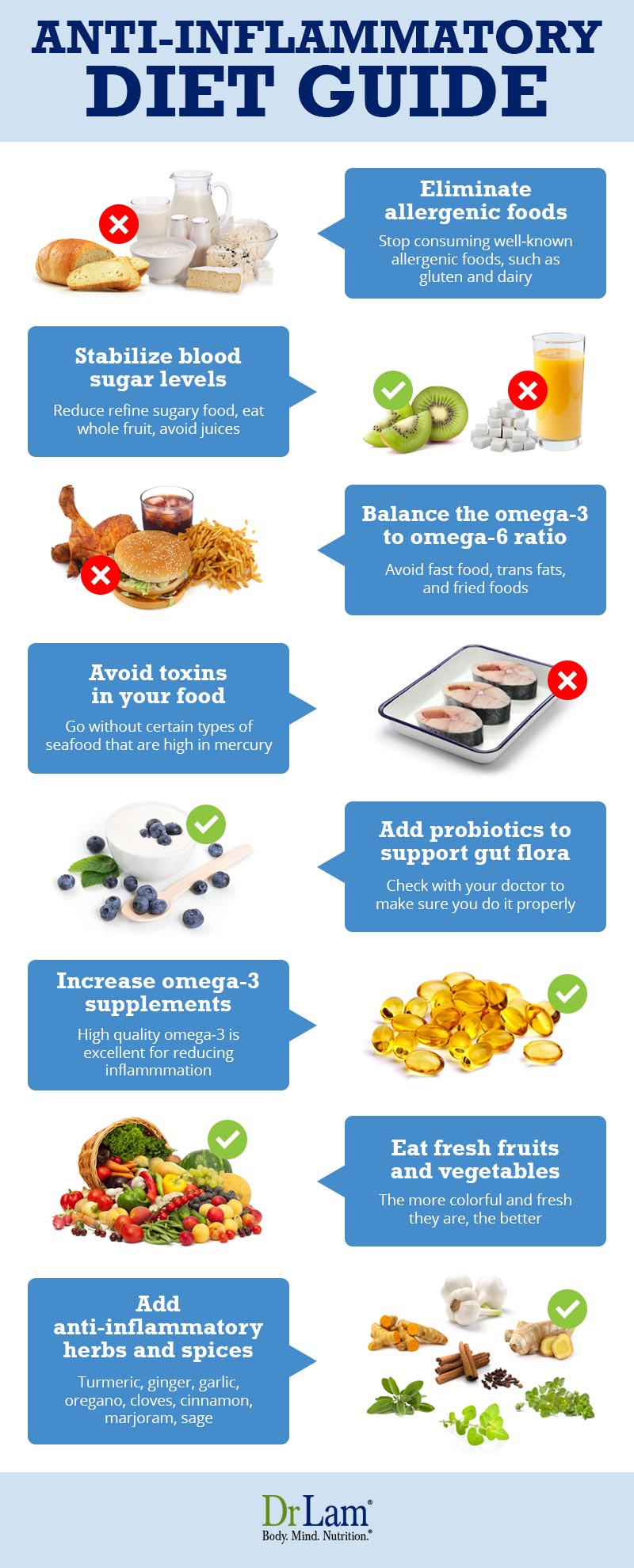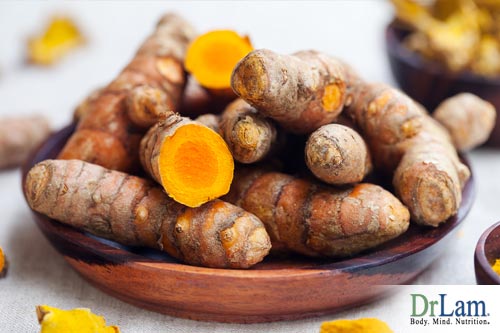 One option while undertaking the anti-inflammatory diet is to try an elimination procedure to figure out what foods you are allergic or sensitive to.
One option while undertaking the anti-inflammatory diet is to try an elimination procedure to figure out what foods you are allergic or sensitive to.
To try food elimination, stop consuming certain well-known allergenic foods, such as gluten and dairy. Then add them slowly back, one by one, into your anti-inflammatory diet, waiting a few days after each to see if you start to feel any signs of discomfort. If you do, this may mean that your body does not tolerate this specific food very well.
The following is a description of some inflammatory foods and guidelines to loosely follow, but as always, the best approach to this is an individual one. Listen to your body and enlist the help of a holistic nutrition expert who can create a blueprint specifically for your condition and needs.
The first goal in an anti-inflammation diet is to stabilize blood sugar levels. This is not just for diabetics.
When your blood sugar is all over the place, your body takes that as a signal that there’s something off. Stable blood sugar is indicative of a steady and healthy supply of food, while highs and crashes signal an irregularity in your environment and possibly a survival threat. Your immune system readies itself, and your entire system is on alert, which is a stressor on the body.
To regulate blood sugar, it’s important to reduce your intake of refined sugar and foods that are very high on the glycemic index. These spike blood sugar levels. These foods and drinks make your body rush to produce more insulin, which then makes your blood sugar crash. This can leave you tired, cranky, and agitated. It also causes inflammation through the insulin-inflammation link.
Eating whole fruits instead of fruit juice is one switch that can help a lot, as the fiber in fruit helps the fructose go into the bloodstream gradually rather than suddenly, as with juice.
If you have AFS, you will also need to take care what kind of fruits you choose. For example, bananas, oranges, raisins, dates, and dried figs are high in potassium, which can worsen the sodium-potassium imbalance in AFS. Also, it’s better not to eat fruits early in the morning in order to avoid blood sugar crashes. These worsen the fatigue already present with AFS.
The next thing to consider is your omega-3 to omega-6 ratio. Ideally, intake of the two should be equal. Unfortunately, due to the amount of polyunsaturated vegetable oils consumed in the typical diet, this ratio is way off.
Omega-6s are off the charts in fried foods, fast foods, and in many processed and packaged foods. At the same time, it’s much more difficult to get enough omega-3s, which are essential to heart and brain health.
 Foods high in trans fats are also something to avoid, as they increase LDL levels, the type of cholesterol that can trigger inflammation in the arteries.
Foods high in trans fats are also something to avoid, as they increase LDL levels, the type of cholesterol that can trigger inflammation in the arteries.
Lastly, it’s important to avoid toxicity in your food and home environment as much as possible.
Certain types of seafood are so high in mercury, for example, that it’s better to go without. Certain cleaning products, highly processed foods, and certain medications and supplements also add to the toxic load in your body and cause even more inflammation. Natural, organic, and fresh foods and products should be your goal whenever possible.
Now, it’s time to add all the good guys into your anti-inflammatory diet.
First, consider taking a probiotic to support your gut flora. However, first check with a medical professional about what type and concentration to use, because you can actually experience an adrenal crash and constipation from overdoing it. You want a dose that gives your gut enough support, yet is easily cleared from your body afterwards.
Next, take a high-quality omega-3 supplement and increase your intake of foods that contain it naturally, such as oily fish and flax seeds. Just make sure that you eat fish from organic fish farms or fish caught in low toxicity waters such as the Pacific.
As for oils, try rapeseed or coconut oil for cooking, or high quality ghee, all in small amounts. Olive oil is great for dressings but not to cook on high heat with.
You might also just want to reduce the amount of oil you use in cooking. For sautéing and light frying, water does just as well as oil. You can add other sources of fat that are healthy and satisfying, such as avocadoes, to balance your micronutrients after lowering oil consumption.
It’s important that you eat at regular intervals throughout the day instead of haphazardly. Fiber and protein rich meals are a great way to feel full and avoid blood sugar spikes and crashes.

Fresh fruits and vegetables are staples to any healthy nutrition plan, but especially so for an anti-inflammatory diet. The more colorful and fresh they are, the better. Make sure that some of your fruits and vegetables are raw, so they can provide your gastrointestinal system with enzymes that help with digestion.
You can also consider digestive enzyme and HCL supplements to help reduce the stress on your digestion. But, again, as with any supplementation, you should consult a professional first. There are some enzyme supplements that work well for AFS, yet worsen inflammation.
After covering the basics, you can get creative. Start to sprinkle your anti-inflammatory diet with nuts, seeds, berries, and sea vegetables.
 Certain herbs and spices are powerfully anti-inflammatory. These are also a great idea to use, and they can even help cut down on too much salt and sugar, as they provide deep flavors to any dish. They include:
Certain herbs and spices are powerfully anti-inflammatory. These are also a great idea to use, and they can even help cut down on too much salt and sugar, as they provide deep flavors to any dish. They include:
Although it may seem a little overwhelming to take up a new lifestyle you’re not used to, just like any big change, if you take it one step at a time, you can make a sustainable and healthy transformation. Eventually you can prevent, support, and even reverse many of the ailments that are caused by inflammation.
There are hundreds of healthy and delicious recipes to learn and resources such as books, articles, videos, and support groups to help keep you on track with your anti-inflammatory diet, weight loss, and hormonal rebalancing.
© Copyright 2017 Michael Lam, M.D. All Rights Reserved.

